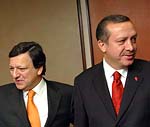French President Nicolas Sarkozy once made headlines with the remark, "If Turkey were Europe, we would know it." In July, European Commission president José Manuel Barroso gave voice to similar European sentiments in a Greek newspaper interview: "Let's be honest," he said, "Turkey is not ready to become an EU member and the EU is not ready to accept Turkey as a member. Neither tomorrow, nor the next day." Despite the overwhelmingly positive European response to Erdogan's recent triumph at the polls, and calls to revamp Turkey's political and economic reforms by European leaders, one fact remains clear: Turkey's membership in the EU is as elusive as ever. Would a Muslim nation of 72 million joining the EU serve to create a dichotomy of two distinct civilizations? Turkey's membership hinges upon introducing an array of political reforms in the areas of civil rights, free speech, and gender equality, as well as changes in its acceptance of general European values. Starkly different in a number of social and political arenas, Turkey stands worlds apart from Europe. Indeed, if the defining line between a civilized and uncivilized nation is the degree to which it accords freedom of speech to its citizens, then Turkey fares poorly. Since shortly before the establishment of modern day Turkey in 1923, one journalist has been assassinated on average every 1.5 years. According to a report released earlier this year by the New-York based Committee to Protect Journalists, in the past 15 years alone, 18 journalists have been murdered in Turkey for merely voicing an opinion contradicting the status quo. Furthermore, up until the 1990s, only China had more "prisoners of thought" than Turkey.
Freedom of Speech and Press
As a country aspiring to become part of the EU, Turkey is obliged to observe laws spelled out by the Charter of Fundamental Rights of the European Union. But as Josh Calder, an analyst at Social Technologies, a Washington, D.C.-based forecasting firm, points out, "Turkey and Western Europe exist in different eras," when it comes to civil liberties.
The European Union Still Eludes a Turkey Culturally Apart

